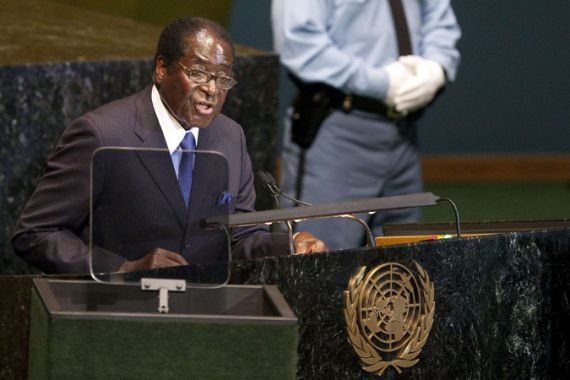Ignoring election results
Sometimes, leaders will not accept election results, whatever voters might tell them.

 |
| Mugabe was sworn in as president in 2008 his opponent was forced to withdraw from the presidential run-off [EPA] |
As in the case of Cote d’Ivoire’s Laurent Gbagbo, some leaders just won’t relinquish power.
Whatever way their country might vote.
Seemingly concrete election results rapidly become irrelevant when those in power refuse to go, as some other heads of state have shown in recent years …
Kenya
President Mwai Kibaki was returned to power in the Kenyan general election of December 27, 2007, despite Raila Odinga’s claims that he was the real winner.
Early on December 30, Odinga accused the government of fraud, urged Kibaki to concede defeat, and called for a recount. Yet the country’s electoral commission declared Kibaki the winner later that day, saying irregularities were a matter for the courts. Kibaki was sworn in immediately and rioting broke out.
Around 1,200 people were killed in the violence and 400,000 fled their homes. The International Criminal Court is currently investigating the post-election violence.
Odinga was right. According to an exit poll commissioned by the US, Odinga had won the election by a comfortable margin – 46 per cent to 40 per cent.
Zimbabwe
Zimbabwe’s 2008 presidential election was seen as one of the biggest challenges to President Robert Mugabe’s decades-long rule.
The poll attracted widespread condemnation for a whole series of controversies, including violence against opposition groups. Even before the vote, organisations like Human Rights Watch argued the process would be “deeply flawed”.
Official results weren’t released for more than a week, and when they finally were, the Zimbabwe Electoral Commission declared that the Movement for Democratic Change’s Tsvangirai has won 47.9 per cent against Mugabe’s 43.2 per cent.
Tsvangirai contested the results, saying he had won an outright majority in the first round. Yet he agreed to participate in the second round – until violence and intimidation forced him to withdraw.
Myanmar
Aung San Suu Kyi’s National League for Democracy scored a decisive victory in Myanmar’s general election in 1990. The pro-democracy party won 392 of the 492 seats in what was the country’s first poll since 1960.
Taken by surprise, the military-backed government refused to recognise the results. Many opposition figures were either arrested or forced into exile.
The victory should have made Aung San Suu Kyi prime minister. Instead she was placed under house arrest, where she was to remain for most of the next two decades.
It was only in November 7, 2010 that the regime allowed the next election. Aung San Suu Kyi was freed from her latest stint under house arrest – six days after the election.